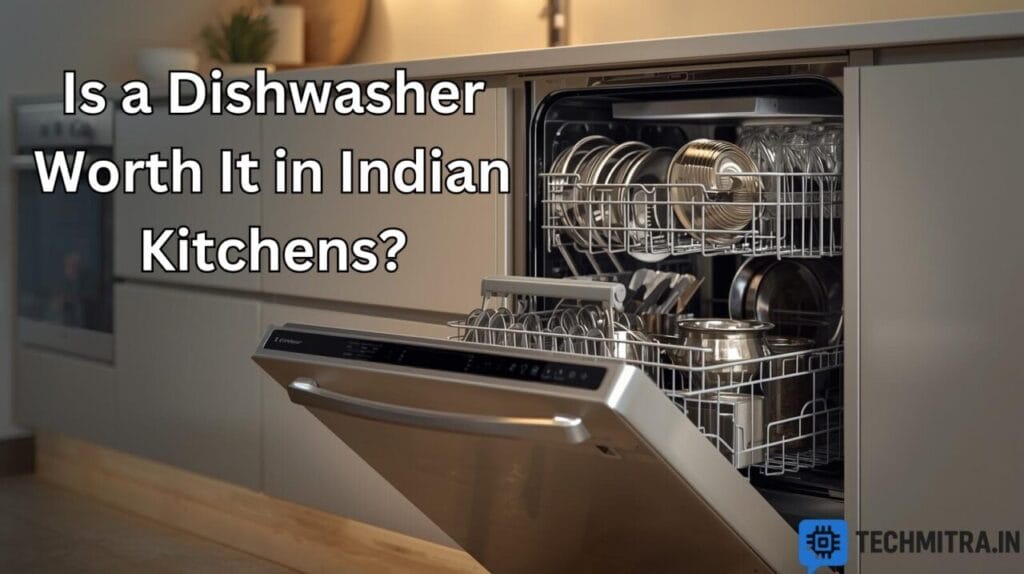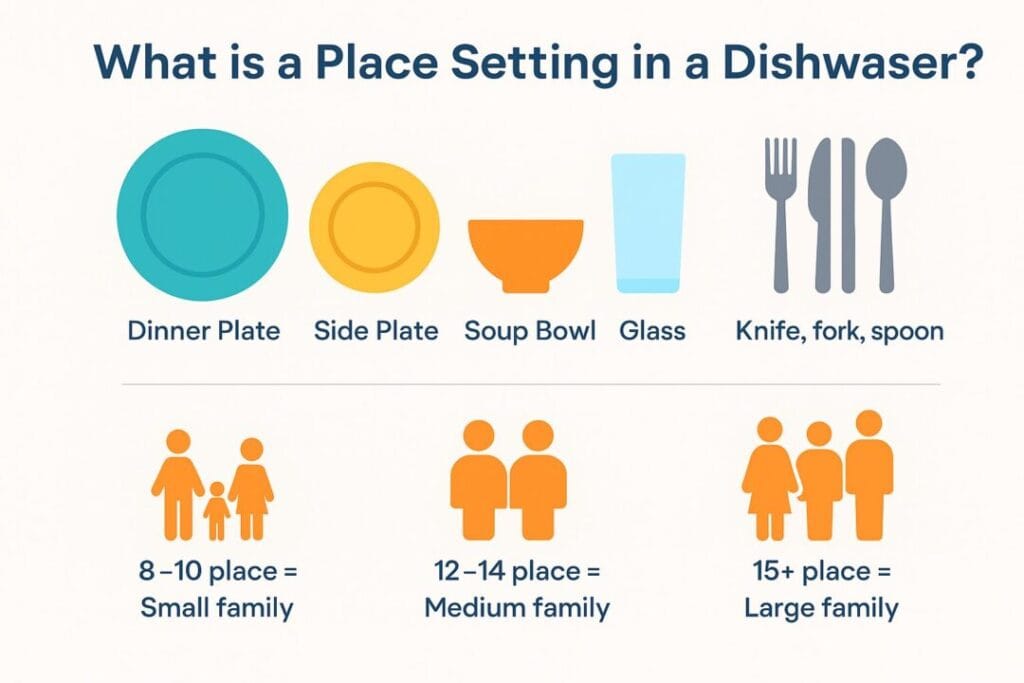
Table of Contents
Introduction To Best Dishwasher In India 2025
Updated on 22-Nov-2025 -The modern Indian kitchen is evolving rapidly. While gas stoves have been replaced by induction cooktops and traditional mixers upgraded to smart food processors, one question still remains—Is dishwasher useful for Indian kitchen ?
Many believe dishwashers are “luxury gadgets” suited only for Western kitchens. However, with increasing water shortages, rising electricity costs, and busy lifestyles, dishwashers are now gaining popularity in Indian homes. But do they truly save time, water, and effort—or are they just an unnecessary expense? Let’s dive deep. and check best dishwasher in India 2025 – Top Models, Prices & Buying Guide
The Rise of Dishwashers in India
Traditionally, Indian kitchens relied on manual washing with running tap water or filled buckets. Domestic help was often available, so dishwashers weren’t considered essential. But things have changed:
Urban nuclear families are growing.
Rising costs of domestic help make automation attractive.
Hygiene awareness (post-pandemic) increased demand for high-temperature cleaning.
Busy lifestyles leave little time for washing dozens of greasy kadhai, tawa, and plates.
As a result, brands like LG, Bosch, IFB, and Siemens now offer dishwashers customized for Indian utensils—strong jets for oily masala stains, kadhai wash cycles, and higher temperature drying.
Pros of Using a Dishwasher
Here are the biggest advantages of owning a dishwasher machine in India:
Saves Time & Effort – Load utensils and let the machine do the rest.
Better Hygiene – Washes at 65–70°C, killing germs and bacteria.
Water Saving – Uses only 9–12 liters per cycle, compared to 40–60 liters by hand washing.
Consistent Cleaning – Removes masala, turmeric, and oily stains more effectively than manual scrubbing.
Handles All Utensils – From glassware to steel kadhai (with the right model).
Energy Efficient – Modern dishwashers consume as low as 1–1.5 units per wash.
Cons of Using a Dishwasher
Of course, there are some challenges too:
Initial Cost – A good dishwasher costs between ₹35,000 – ₹55,000.
Space Requirement – Needs proper installation and water connection.
Not All Utensils – Aluminum, non-stick, and wooden items may not be dishwasher-safe.
Cycle Time – A full wash cycle takes 60–120 minutes.
Running Costs – Dishwasher salt, rinse aid, and detergent add to monthly expenses.
Water Usage: Dishwasher vs Hand Washing
This is where dishwashers surprise most Indians.
Hand washing (with tap open): 40–60 liters per session.
Hand washing (with bucket): Around 20–25 liters.
Dishwasher: Just 9–12 liters per full load (depending on model).
Clearly, dishwashers save more than 60% water, making them eco-friendly and ideal for cities facing water scarcity.
What Is Place Setting in Dishwasher?
When you compare dishwashers, you’ll often see 8 place, 12 place, 14 place, or 15 place settings. But what does that actually mean?
A place setting is a standard measure used worldwide to indicate the capacity of a dishwasher.
One “place setting” generally includes:
1 Dinner Plate
1 Side Plate
1 Glass
1 Soup Bowl
1 Tea Cup with Saucer
1 Knife, Fork, and Spoon
So, a 14-place setting dishwasher can wash around 14 sets of such items in one cycle.
What It Means for Indian Homes
8–10 Place Setting → Compact, good for small families (2–3 members) or apartments with limited space.
12–14 Place Setting → Ideal for medium families (3–6 members), the most popular size in India.
15+ Place Setting → Large capacity, best for joint families or households with frequent guests.
Important: Since Indian cooking uses kadhais, tawas, cookers, and serving bowls, brands like Bosch, LG, and IFB design their dishwashers with special racks and intensive wash programs to accommodate these larger utensils.

Electricity Consumption & Costs
Most dishwashers in India consume 1–1.5 units per wash.
If you run the dishwasher once daily, it adds about 30–40 units per month.
At an average rate of ₹8 per unit, this is ₹240–₹320/month.
That’s less than what many households spend on domestic help for dishwashing.
Common Misconceptions About Dishwashers in India
“Dishwashers can’t clean masala and oily stains.”
Modern Indian models (like Bosch & IFB) have Intensive Kadhai Wash programs for tough grease.
“They waste water.”
Actually, they use less water than hand washing.
“They are only for big families.”
Even 2–3 member families can benefit, as most machines have half-load options.
Should You Buy a Dishwasher Machine For Home in India?
Yes—if you:
Live in a city with water shortage.
Want to reduce dependence on house help.
Value hygienic, germ-free cleaning.
Cook Indian meals with oily gravies and masala.
Maybe not—if you:
Rarely cook at home.
Have very limited kitchen space.
Can’t invest ₹35,000–₹50,000 upfront.
Important Buying Tips (Avoid Cheap Brands)
When purchasing a dishwasher in India:
Choose trusted brands like Bosch, IFB, LG, Siemens.
Look for Indian utensils support (Kadhai wash, strong jets).
Prefer energy-efficient (A++ rating) models.
Ensure after-sales service availability in your city.
Do NOT go for cheap, no-name brands—dishwashers require quality build and reliable service. Remember: Quality does not come at a very low price.
Best Dishwasher in India 2025 (Amazon Picks)
Here are some excellent models you can buy right now:
1. LG 14 Place Setting Free Standing Dishwasher
TrueSteam & QuadWash technology
Wi-Fi control, Smart Diagnosis
Water consumption: ~9.6 liters
Warranty: 2 years product, 10 years motor
Best for tech-savvy families who want premium features.
2. Bosch 14 Place Setting Dishwasher
Intensive Kadhai Program (70°C hot wash)
Cleans & dries in just 59 minutes
Vario Speed & Express Sparkle modes
Perfect for Indian kitchens with heavy cooking.Steam Treatment & Wifi
3. IFB 15 Place Settings Dishwasher with DeepClean®
15 place settings (big family friendly)
A++ energy efficiency
Hot water wash & hygienic steam drying
Ideal for large Indian families.
4. IFB 14 Place Settings Dishwasher
DeepClean Technology
Saves up to 66 liters water per wash
Affordable yet high quality
Best budget-friendly option without compromising quality.
Comparison table of 4 dishwashers
| Dishwasher | Capacity | Price Range | Link |
|---|---|---|---|
| LG 14 Place Setting Dishwasher (TrueSteam, QuadWash, Wi-Fi) | 14 Place | ₹40,000 – ₹55,000 | View on Amazon |
| Bosch 14 Place Setting Dishwasher (Indian Utensils, Intensive Kadhai Wash) | 14 Place | ₹45,000 – ₹50,000 | View on Amazon |
| IFB 15 Place Setting Dishwasher (DeepClean® Technology, A++ Efficiency) | 15 Place | ₹45,000-₹50000 | View on Amazon |
| IFB 14 Place Setting Dishwasher (DeepClean®, Water Saving) | 14 Place | ₹35,000 – ₹40,000 | View on Amazon |
Final Verdict
So, is a dishwasher worth it in Indian kitchens?
Absolutely YES for most urban households.
It saves water, electricity, and time, while ensuring hygienic cleaning that manual washing cannot match. The initial cost may feel high, but in the long run, it’s a smart investment.
Just remember—don’t compromise on quality. Avoid cheap, unreliable brands. Stick to Bosch, LG, or IFB for peace of mind.
FAQs
Q1. Can a dishwasher clean oily Indian utensils like Kadhai and Tawa?
Yes, modern dishwashers have 70°C Intensive Wash modes designed for masala and grease.
Q2. How much water does a dishwasher use per wash?
Most models use 9–12 liters per full load, which is far less than hand washing.
Q3. Are dishwashers expensive to run?
Not really. Around ₹250–₹300 per month in electricity, plus detergent and rinse aid.
Q4. Do dishwashers require special detergents?
Yes, you’ll need dishwasher tablets/powder, rinse aid, and salt for best performance.
Q5. How long does a dishwasher last?
With proper care, a branded dishwasher can easily last 10–12 years.
Affiliate Disclaimer
Techmitra.in is reader-supported. Some of the links in this article are affiliate links. This means that if you click on these links and make a purchase, we may earn a small commission at no extra cost to you. We only recommend products that we believe are of good quality, useful, and relevant for our readers. Your support helps us keep providing valuable content. Thank you!
